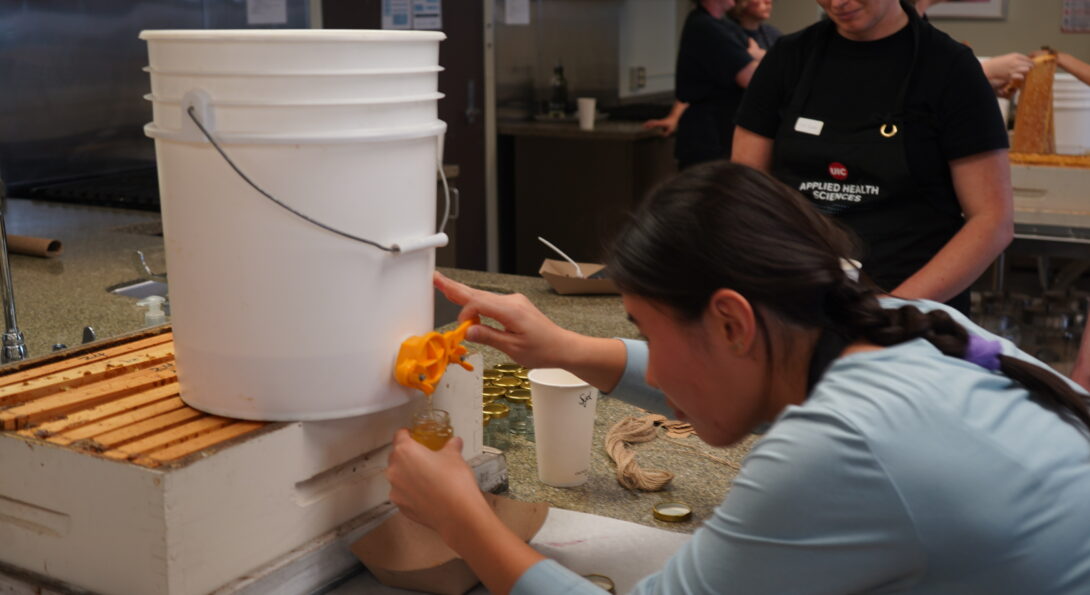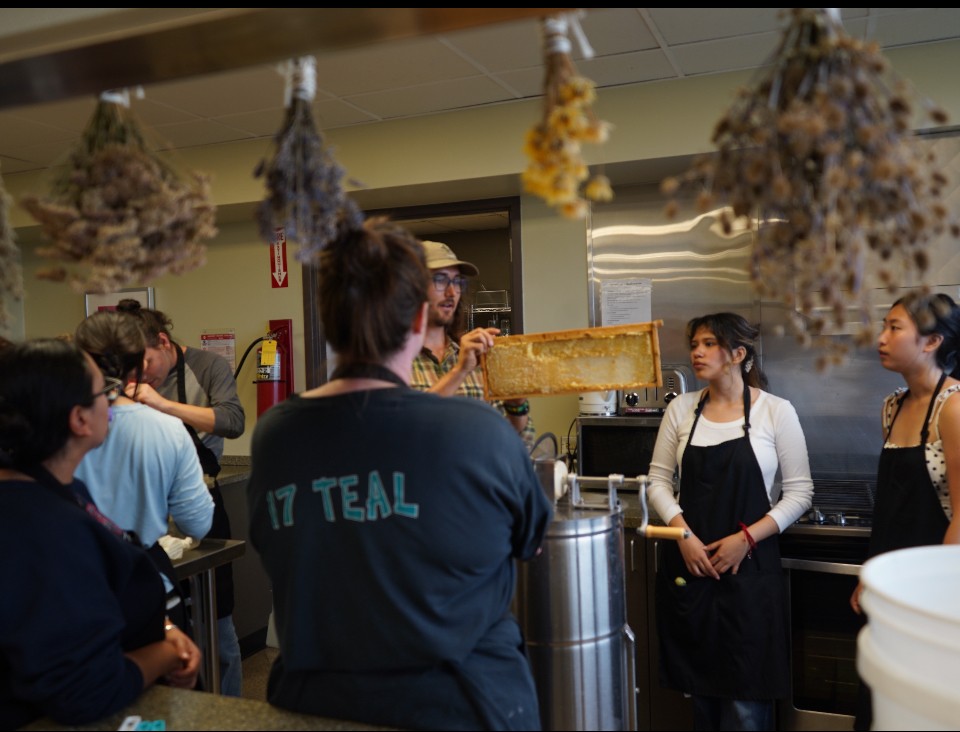Nutrition Teaching Garden shows students how to keep bee hives, harvest honey and garden sustainably

Body
As an abundant summer season in UIC’s Nutrition Teaching Garden came to a close, garden manager Renea Lyles ’16 MS NUT and student volunteers focused their attention on the garden’s honeybee hives. In partnership with Chicago Honey Co-Op, the Nutrition Teaching Garden hosted beekeeping and honey harvesting classes for the second fall in a row, with three events in September and early October.
Lyles received a grant in 2023 from UIC’s student-led Sustainability Fund to build up the garden’s beekeeping programming. UIC has been designated an official Bee Campus for its commitment to supporting pollinators since 2017, and across the university, related initiatives protect and promote the health of the natural environment and green spaces. The hives in the Nutrition Teaching Garden have added a welcome layer of beauty and sustainability to the west campus.
“We’re seeing more blooms, better yields and a new buzz of energy in the garden as our honeybees mingle with existing pollinators,” said Lyles. “By observing the role that pollination plays in our food system, students learn to think from a systems perspective and recognize that every part of the environment, from soil to pollinators to humans, plays a role in ensuring that foods relying on bee pollination can continue to thrive and nourish us.”
Through Elise RoBison, agricultural foreman of the biological science department’s greenhouse, Lyles contracted Chicago Honey Co-Op to manage the hives and lead several seminars throughout the season.
Body II

This fall, Lyles, Human Nutrition Foods Lab manager Emily Delunas and 24 students harvested 55 pounds of honey with the help of Chicago Honey Co-Op’s equipment and expertise. Like the rest of the produce from the garden, the honey was used primarily in recipes prepared during nutrition courses, such as HN 110 Introduction to Foods, HN 300 Food Science and HN 405 Food as Medicine.
Though nutrition students interact most with the garden during coursework, Lyles maintains a group of volunteers from programs across campus, undergraduate and graduate, who keep the garden going throughout the season.
One of these volunteers is Ayah Kabbani, a second-year undergraduate majoring in Integrated Health Studies, minoring in Nutrition and working toward postgrad studies in the College of Dentistry through UIC’s Guaranteed Professional Program Admissions. In her first year working in the garden and with the bees, Kabbani found the experience both educationally and personally fulfilling.
“It’s been really fun getting to take care of the plants and pick the produce, knowing exactly where the ingredients I’m using came from,” Kabbani said. “I’ve loved getting to learn about beekeeping hands-on. I also like that it gives me the opportunity to work in the closed-loop system of the garden, because it makes what I’m learning feel so much more real and applicable.”
Beyond her own studies, Kabbani also recognizes the important part the bees play in the garden’s flourishing.
“They play a huge role in maintaining the ecosystem. At home, I planted flowers like zinnias and marigolds to attract bees and other pollinators; I’m sure the effect is increased exponentially with whole hives in the garden.”
Though pounds of honey were harvested for use in classroom cooking, more than half of the honey produced was left in the hives for the bees to consume over winter, increasing their chances of surviving the harsh Chicago weather. Lyles looks forward to years of continued beekeeping and is pursuing new funding sources to keep the program running for the benefit of both the garden and her students.
Quote
I want students to see sustainability as a practice of preparation and resilience — a call to adapt thoughtfully in a changing world. In the garden, it’s something you can touch, taste, see and practice. Students see firsthand how food systems, climate resilience, food access and community health are all connected.